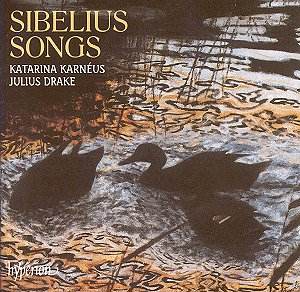What is a mezzo-soprano (5)?[see What
is a mezzosoprano? part (1),
(2),
(3),
(4),
(5),
(6),
(7)]
Earlier articles/reviews in this series were dedicated
to Magdalena Kozena (1),
who may be a real soprano, the "mezzo-contralto" Rebecca de
Pont Davies(2),
Malena Ernmanís splendid disc of cabaret songs (3)and
the always-welcome Anne Sophie von Otter singing Chaminade
(4).
Von Otter, I concluded, is a superb example of a "typical"
mezzo-soprano. I would like to temper that now by describing her as
a typical "high" mezzo-soprano, with a type of voice which,
while maintaining a mezzo richness throughout its range, is basically
light and agile, the sort of mezzo who can excel in roles like Oktavian
which are also sung by sopranos.
If you turn to Katarina Karnéusís new disc,
you will hear another kind of "typical" mezzo-soprano. While
I wouldnít recommend her to call herself a "mezzo-contralto"
as de Pont Davies does, this is an altogether darker voice-type compared
with von Otter, a typical "low" mezzo-soprano.
I reviewed Karnéusís first disc, a recital of
R. Strauss, Mahler and Joseph Marx in EMIís Debut series (CDZ 5 73168
2) with some reservations, feeling there was still work to be done.
I havenít gone back to refresh my memory and I hardly wish to do so
since the work has evidently been done now. What we have on this Sibelius
disc is a young voice in all its first fresh glory. The only hint of
the doubts I had before came in a few highish notes with a rather "white"
tone in a lighter piece like "Tennis at Trianon", op. 36/3.
For the rest everything is wonderfully even and controlled. The basic
register has, as I say, a rich, dark quality which she can extend upward
to an A or even a B flat. There is nothing of von Otterís "lightness"
in these high notes; true to her voice-type, Karnéusís notes
above the break are dramatic, thrilling, and magnificently stable. She
can also offer some smouldering descents into the chest register.
Another important aspect of Karnéusís technical
armoury is her avoidance of vibrato. Voices without vibrato can have
an irritating choir-boy-like quality which the Italians call "fisso"
Ė fixed. They can also seem out of tune even when they are not. This
word "fixed" perhaps explains it, since it suggests the voice
is somehow held steady so the vocal chords do not vibrate freely.
Karnéusís voice is, in fact, vibrant, not "fixed"
at all, but without a trace of vibrato in the sense of "wobble".
Vibrato in the wobble sense of the word can be attractive when the voice
is fresh and young but it has a way of getting out of hand as time goes
on (think of Bartoli); Karnéus exhibits a solidly-based, perfectly
controlled instrument which should remain with her (and us, I hope)
for a long time.
I have quite deliberately avoided giving specific examples
since the achievement is so consistent that virtually any song would
do. Similarly, I donít want to go into the interpretations more specifically
than to say that she shows full commitment and embraces a range from
gentle simplicity to the extremely dramatic (also this is a quality
I was not sure about in the previous disc). Again, I do this because
I donít want to give the idea that some things stand out as better managed
than others. In fact, pushed for time as I was, there were several songs
where I just had to press the repeat button; but why tell you which,
perhaps your favourites will be others? Those critics who did not share
my reservations about Karnéusís previous disc, let alone those
who did, will surely be overwhelmed by this one which surely announces
the arrival of a major artist.
Karnéusís EMI disc had a balance in favour of
the voice that made Roger Vignoles appear a rather retiring partner
(which I suspect was not the reality). Hyperion have provided a finely
balanced recording and Julius Drake is strikingly rich in tone without
ever dominating - they make a fine partnership.
And a word about Sibeliusís songs. The general idea
is that he was a great composer of symphonies and orchestral tone-poems
who "also wrote" a lot of smaller pieces, the implication
being that it isnít very good. With a lot of the piano music this is
alas the case, but his songs are highly individual and poetic creations,
fully comparable with the work of contemporaries like R. Strauss, Mahler
and Rachmaninov. If you donít know them this disc will be an ideal introduction.
And even if you have other recordings of them, why not treat yourself
and add this?
Informative notes from long-standing Scandinavian music
champion Robert Layton, with French and German translations, texts in
the original languages and English and a beautiful cover taken from
a painting by Bruno Liljefors complete an issue for which I can find
only praise.
Christopher Howell
[see What
is a mezzosoprano? part (1),
(2),
(3),
(4),
(5),
(6),
(7)]


